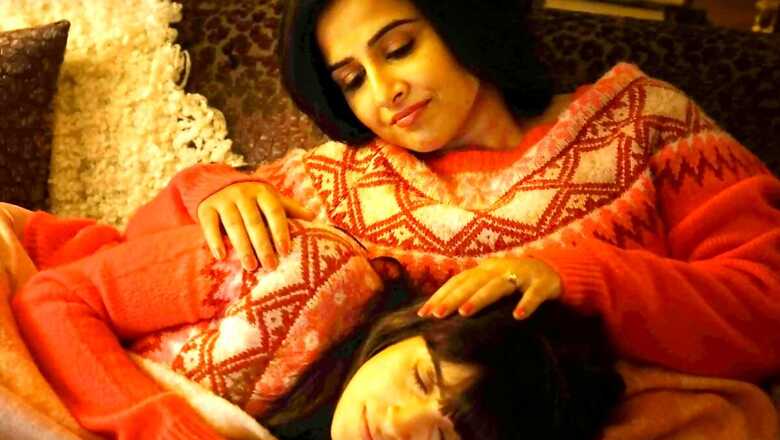
views
In one of the scenes of the film Shakuntala Devi, Sanya Malhotra's character, Anu, screams at her mother, Shakuntala Devi (Vidya Balan), resentfully. "Aap baki moms ki tarah normal kyu nahi ho sakti hai?" (why can't you be normal like the other moms?) she asks, fuming with anger. But, instead of retaliating or feeling hurt by her teenage daughter's remark, Shakuntala Devi calmly responds, "Jab amazing ho sakti hoon, toh normal kyu banu?" (why should I try to be normal, when I can be amazing?).
There are many moments in this film when you wish that the director, Anu Menon, had followed Shakuntala Devi's belief, and tried to tell the 'amazing' story of an Indian woman mathematician, who was a child prodigy, was named a 'human computer', had an exceptional knack for astrology, wrote cookbooks, supported LGBTQ rights openly in an era when the gay rights movement was in a nascent stage in India, and fought election against Indhira Gandhi. However, Menon chooses to be 'normal'. Her film, for most parts, dwells on Shakuntala Devi's fraught relationship with her daughter, Anupama. Everything else is a touch-and-go.
In Menon's defense, the film begins with a disclaimer that says, 'it is a true story as seen through the eyes of a daughter, Anupama Banerji' setting the expectation right for the audience. Menon shows Devi's life through the prism of her relationships -- with her parents, sister, husband, and of course, daughter. However, even as she builds this private life of Devi, her storytelling remains strangely superficial.
For starter, we see a five-year-old Shakku scoff at her father for not being the provider of the family and using her as a 'money bank'; that's the length and breadth of Devi's relationship with her father as shown in the film. We are told (and not shown) by the young Shakku (Shakuntala Devi) that she despises her mother for being a spineless woman who doesn't have the guts to stand up to her husband and that's again barely two scenes spent on a relationship that not only shapes her but also impacts her own relationship with her daughter in the years to come. For a child prodigy, who was discovered at the age of 3, around whom neighbours would often flock to watch her solve math equations, and people would come to visit her from other states, whom the press wanted to cover, and who was fondly called 'baby Shakuntala' in a time prior to Instagram glory of young children, and viral videos of kids, her childhood is given barely 10 minutes in the film.
A minute or so is spared on the scene that aims to show the audience that she loved her differently-abled sister so much that she would forever hate her parents for not providing her proper treatment. The young love that she wants to marry, and shoots at when she finds out that he was getting married to another woman, only get a scene, and the Spanish lover stays for exactly a song and a make-over before bidding adieu to Devi for no clear reason. So much for examining the private life of a math genius, through her relationships!
In the meantime, Menon hurries through different montages of Devi's uncountable accomplishments, so that she can finally reach the second half, where her film explores the mother-daughter relationship, that's the central theme of the film. In that rush, unfortunately, this biopic does away with many aspects of Devi's life that would perhaps not only be entertaining to watch but also inspiring to many.
Devi was a performer, a magician with numbers, who never formally learned mathematics, and was, therefore, always outside the academic circles, even though she wowed them from time to time. However, because of her performative skills, her natural stage presence and confidence, she quickly won over the young audiences, in schools and colleges. The film focuses on the angsty daughter who 'hates math,' because her mother is obsessed with numbers, yet what it fails to show that Devi had, over the years, been an inspiration to many young girls who wanted to study mathematics and forge a career in STEM.
She would often organize math clubs and teach kids for free, handholding them through numbers to help them get over their fear of maths. She also wrote many books not just for IIT, and MBA aspirants, but also for young kids. In her book, In The Wonderland of Numbers: Maths and Your Child, she introduces her little readers to Neha, a girl who starts to hate maths after a new math teacher arrives and ends up getting a zero in her test. But, due to certain turn in circumstances, she journeys into the Kingdom of Zero and conquers her fear of the subject. This book is a wonderful tool to introduce young kids to numbers through a story, which can be used by parents and teachers.
Devi was liberal and free of judgment and upheld each individual's right to get respect for their identity. For her young readers, she suggests in the book, 'Awaken The Genius Of Your Child' that parents should subscribe to kids' magazines in the name of the kid so that the child gets a clear sense of his own identity from the beginning. She writes, "By having the postman deliver a large cover with your child's name printed on it, you are telling your child, 'You have your identity. A right to your own magazine. Here it is.'"
However, another bigger fight for identity, and acceptance that she took upon herself was with her book, 'The World of the Homosexuals', in the preface of which, she wrote, "Homosexuality is basically as old as humanity, but what is comparatively new and urgent, is the need for the contemporary society to come to terms in its thinking and its law-making, both with psychological knowledge and human behaviour'. Devi had always been considered an ally of the LGBT community, and the reason that she had stated for writing the book was because her husband Paritosh was gay. In Vismita Gupta-Smith’s documentary For Straights Only (2001), Devi herself revealed how the discovery that her husband was gay ruined her marriage but at the same time prompted her to study and understand homosexuality, and that is how the book evolved.
Menon's film, however, counters Devi's claim that her husband was gay. In the film, we see Balan's Shakuntala Devi owning up to fabricating the story of her husband being gay to her daughter Anu (Sanya Malhotra) saying that she did so because her credibility to write on homosexuality was being questioned. By inventing a personal narrative where her husband was gay, she wanted to give 'legitimacy' to her book, so that at least it starts a conversation about homosexuality. The claim that she lied is a serious one, especially for the LGBT community, and is, of course, the revelation of Devi's daughter to Menon, but the reasons why Devi choose to do so (if at all she did) is not delved into, like many other aspects of Devi's life.
Menon's film doesn't offer many insights into the extraordinary brain of Shakuntala Devi, or her journey that inspired millions. Why Devi thought of fighting elections, that too against Indira Gandhi, is not shown. Her royal clients and dignitaries who would take her advice on important matters of their lives because of her astrological powers is a skip and a hop, and her rubbing elbows with some of the most important personalities of the world are a part of a photo book, nothing else. That's probably the problem of telling a story through one person's eye, even if it is the daughter, it is a narrow perspective, that in no way can encompass a multifaceted personality like Devi. Balan, however, imbues Shakuntala Devi's character with life and ambles through the shoddy script, trying to make fleeting scenes, and montages from Shakuntala Devi's life memorable.
For a good part, Menon's film labours to depict the complexities of Devi and her daughter's relationship and stays true to the daughter's perspective. It tries to tell the same old story of how daughters often replicate their mothers' thought patterns and actions, even those thoughts, and actions that they resent. For any other film, with a script that shows a layered dynamics between the mother-daughter duo, it would make for a compelling story. For instance, Aparna Sen and Konkona Sen Sharma's film Titli, directed by Rituparno Ghosh, is an excellent study of intimacy between a mother-daughter. However, Shakuntala Devi's story needed more, because she wasn't just a mother, but also an exceptionally creative woman, and a genius at that.



















Comments
0 comment